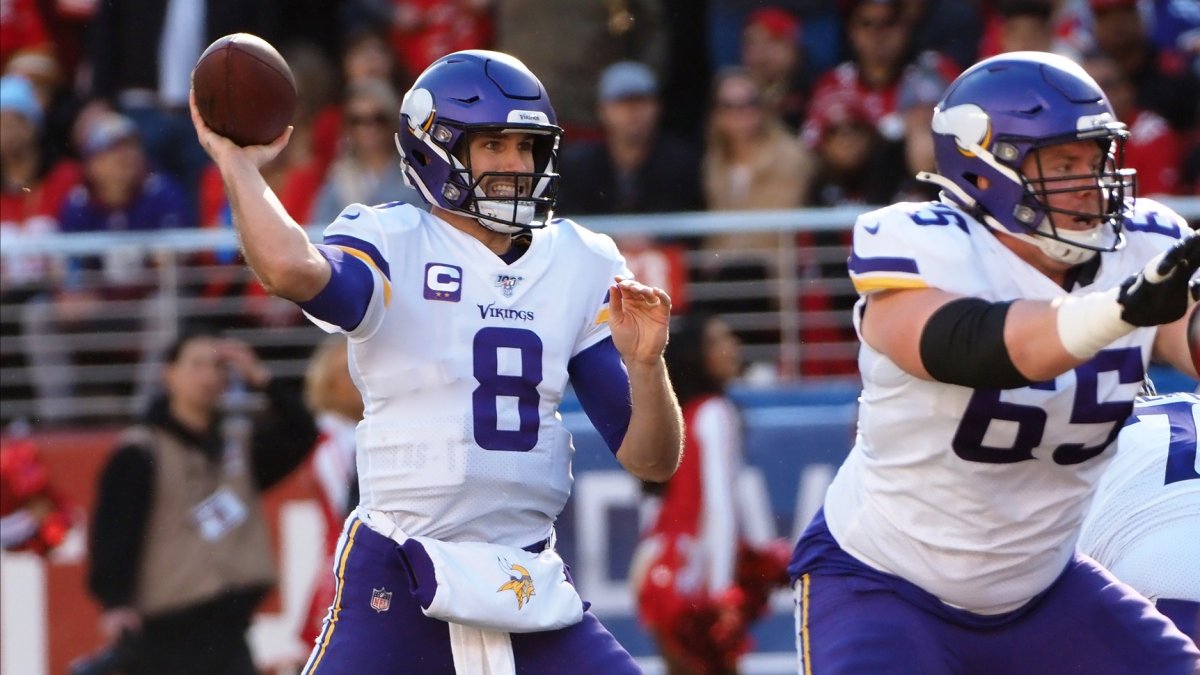With a year remaining on the unusual three-year, fully-guaranteed contract that the Minnesota Vikings gave Kirk Cousins in 2018, the team has decided to effectively recreate it by signing Cousins to a two-year extension.
Cousins gets one more year of fully guaranteed money tacked on to his contract and one more year that becomes guaranteed in a year’s time. The Vikings, on the other hand, get $10 million in extra cap space to play with this offseason, which will undoubtedly help them address some needs on the roster.
[Editor's Note: All EDGE and ELITE subscribers have full access to our free agency database, including rankings, grades, PFF WAR, contract projections and more! Subscribe today!]
Cousins was initially brought in because he represented a different style of quarterback to the ones the Vikings had fielded for a number of years — one capable of big-time throws (PFF’s highest-graded passes) and executing comebacks whenever the team found itself in a hole.
They knew that he was never likely to be the best passer in the league. Still, they were willing to risk the negatives because they had what they believed to be a championship-caliber roster that just needed a little more help on occasion from the quarterback.
To be fair, Cousins has essentially lived up to what they thought he would be. His first season saw him earn an overall PFF grade of 79.3, which was around his previous career baseline, but he then had a career year while playing in a new offense in 2019, earning a grade of 84.1 and showing some of his best play on a more consistent basis.
Kirk Cousins: PFF overall grade and rank by year (2015-2019)
| Season | PFF Overall Grade | Rank |
| 2015 | 71.6 | 15/40 |
| 2016 | 80.6 | 10/37 |
| 2017 | 70.0 | 20/41 |
| 2018 | 79.3 | 15/39 |
| 2019 | 84.1 | 6/39 |
If you take out one disastrous game against the Green Bay Packers in Week 2, his grade for the season actually jumps to 90.8, making him one of the best quarterbacks in the game.
The concern for the Vikings is that, despite this, the team around him began to be eroded, and they were clearly outclassed by a Super Bowl-bound San Francisco 49ers team in the playoffs.
They now head into an offseason where there are significant weaknesses on the roster that need to be addressed if Cousins is to be able to execute what is expected of him. He can be a player who guides an excellent roster and potentially shows up big in one or two games where he needs to dig them out of a hole, but he hasn’t shown he can be a player that does that on a weekly basis if the team isn’t as good as it used to be.
The Vikings don’t have the same level of championship roster they had when they went to the NFC Championship game in 2017; they don’t have a cornerback on the roster who earned a PFF coverage grade north of 63.0 last year, and not a single member of the group that played in 2019 surrendered a passer rating better than 90.0 when targeted. They have been forced to release or let walk some of the best players from that 2017 defense, and even with the moves they have made, they still don’t have a huge amount of salary cap space to address all of their issues.
This offseason is a high-wire act with little margin for error for Minnesota. Between free agency and the draft, they need to patch up problem areas as well as come away with some legitimate impact starters — and that's a situation that no team wants to be in.
In 2019, Kirk Cousins finished fourth in adjusted completion rate (80.2%) and was a generally efficient passer within the new offensive scheme in place. He is a solid quarterback for the environment that he is in but always leaves some wanting more. For a player as capable as he is of top-end throws, he finished just 15th in terms of total big-time throws, behind rookie Kyler Murray and 42-year-old Tom Brady, whose season was seen as little more than a sign of his demise.
Realistically, Cousins did everything that could be expected of him when he signed that first contract, but the size of that contract was always going to stress Minnesota’s ability to maintain a championship-caliber roster around him. However, this second deal may change the terms of the arrangement a little bit because the Vikings now need their starting quarterback to be more than just a steady hand that gives them a chance to come up big if things go awry in the playoffs. Given the deterioration of Minnesota’s roster around him, they now need Cousins to elevate the play of those around him and actually make up for some of the shortcomings elsewhere on the team.
The jury remains out on whether he actually can do that, but if he can't, the Vikings will likely struggle to keep pace with the genuine contenders in the coming seasons. The league is currently being dominated by the teams that either have true superstars at the position — Patrick Mahomes, Lamar Jackson, etc. — or have rosters so strong that they can head deep into the playoffs without needing their quarterback to do much (49ers).
Right now, the Minnesota Vikings don’t appear to belong in either category. Unless Cousins can develop into something he has yet to be, their path to that elusive Super Bowl would seem to be blocked or, at the very best, hard to navigate.



 © 2024 PFF - all rights reserved.
© 2024 PFF - all rights reserved.